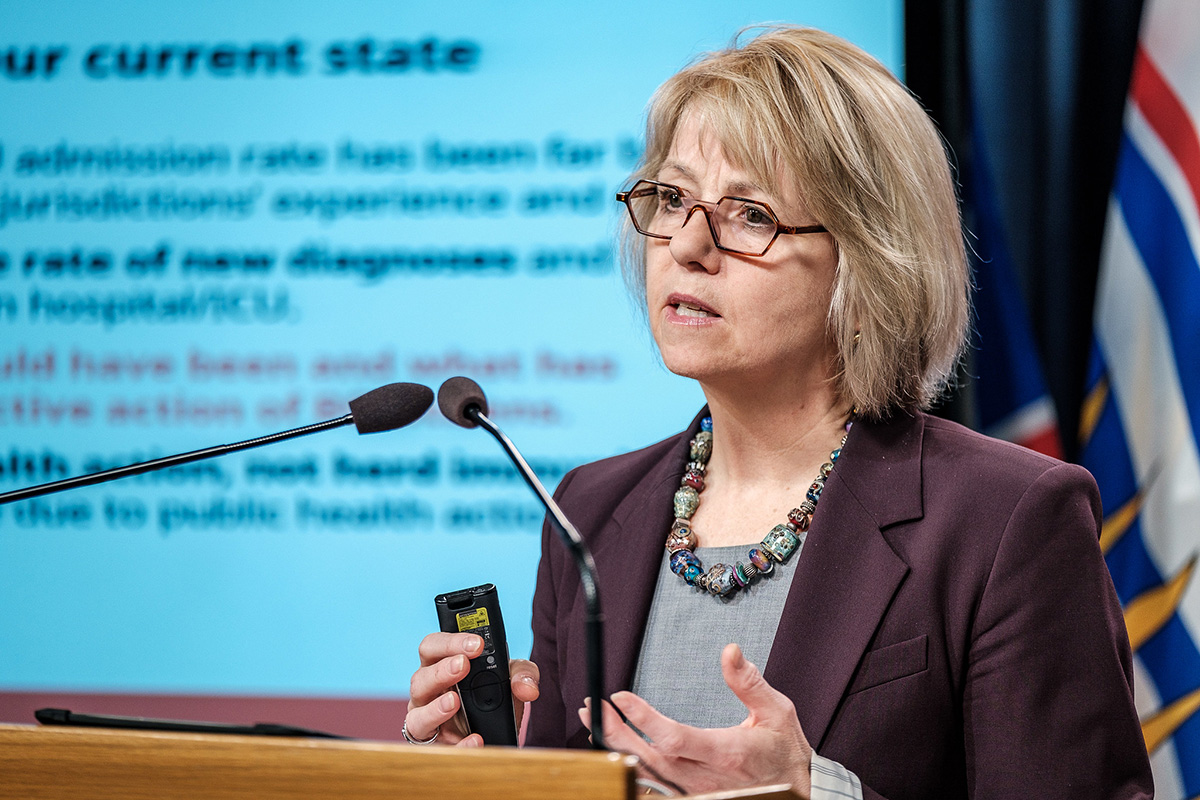B.C. has averted a much more severe COVID-19 outbreak by adopting stringent physical distancing measures early and must stay the course, provincial health officer Dr. Bonnie Henry said today.
“The difference between what could have been and what actually happened is because of the public health measures we took here in B.C., individually and collectively,” she said.
“We are on the right track, but we must hold the line.”
Health officials presented new modelling today that shows the rates of new cases and hospitalization have slowed significantly and the number of patients in intensive care has stabilized. In all cases, the numbers are far below projections late last month that forecast case numbers similar to China’s Hubei province.
The number of patients in critical care has levelled out around 58 in the past days. Models based on Hubei’s outbreak presented three weeks ago estimated B.C. could peak at over 160 patients in intensive care.
The number of new cases each day has also flattened and even slightly declined in recent weeks.
“We start to see a gradual decline in the number of new cases each day,” said Henry, crediting the closing of schools, travel restrictions and encouraging non-essential workers to work from home. “That’s our bending the curve.”
But it’s too soon to become complacent, Henry said. “This is not even the beginning of the end.”
It can take up to six weeks to know whether someone will recover from the disease and the province will continue to see more cases and virus-related deaths in the future, she warned.
The median age for confirmed cases in B.C. is 54. Due to heavy testing among health-care workers, 53 per cent of confirmed cases are female. The median age of the 78 people who have died so far in the province is 86, while for those who have been hospitalized it is 68.
But the new data does represent a turning point in the tools available to the province to make public health decisions.
Health officials had been using data from other countries to develop models and projections. Now there is enough information on B.C.’s own outbreak to guide decisions on the optimal level of physical distancing and other measures to weather the pandemic in the long run.
“New models are going to be based on our experience in B.C. and understanding of the virus will guide us as we go forward,” said Health Minister Adrian Dix.
A prime focus will be on planning how to resume non-urgent and elective surgeries that were cancelled or postponed to create capacity for a potential surge of COVID-19 patients.
Critical care beds in the province are at 45.7-per-cent capacity on average, with Interior Health at 66.3-per-cent capacity with both COVID-19 and non-virus patients.
Dix hopes some operations will be able to resume sometime in May.
“Critical care capacity in B.C. thus far in the pandemic has been sufficient,” he said. The goal will be to ensure resuming surgeries doesn’t create the risk the health system will be strained if there is another surge in COVID-19 cases.
Henry said the modelling will also help officials understand the potential impacts of changes to current measures to prevent the spread of the virus, like resuming in-classroom education in some form or allowing more people to go to work.
But relatively stringent measures will continue for the coming weeks and months, she said.
A vaccine is needed to achieve meaningful community immunity, Henry said. If measures are eased too much before immunity is achieved, it would likely result in a resurgence of the virus that could overwhelm the health-care system and put B.C. back to square one.
“We are experiencing a slowing of our rate of new infections, and we want that to continue, we need that to continue to move onto the next step,” said Henry.
She noted she expects the summer to bring more opportunities to connect with friends and family.
“We will have opportunities for being together again.” ![]()
Read more: Health, Coronavirus, BC Politics

















Tyee Commenting Guidelines
Comments that violate guidelines risk being deleted, and violations may result in a temporary or permanent user ban. Maintain the spirit of good conversation to stay in the discussion.
*Please note The Tyee is not a forum for spreading misinformation about COVID-19, denying its existence or minimizing its risk to public health.
Do:
Do not: